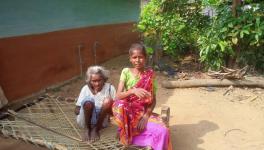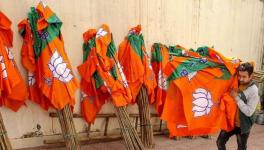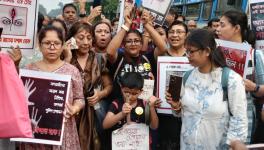Bengal Workers, Farmers Ready for Nov 26 General Strike; Artists’ Outfit Extends Support
Kolkata: The West Bengal units of trade unions, farmer outfits, independent federations and associations have reached the penultimate stage of their joint and independent campaigns in support of the countrywide general strike on November 26 against the “anti-people, anti-worker and anti-farmer” policies of the Union government.
As the organisations are busy fulfilling the pre-determined campaign programme in the remaining three days, they have received a shot in the arm with the West Bengal Democratic Writers Artists Association extending its moral support to the objectives and considerations that have led to the call of a countrywide general strike on November 26.
In a statement, the West Bengal Democratic Writers Artists Association’s president Pabitra Sarkar and general secretary Rajat Bandyopadhyay said they have been noticing with great concern that the people of India are passing through a crisis; a communally-charged atmosphere is being created and pre-planned attacks are being mounted on farmers and workers on the pretext of the continuing pandemic. The situation is also finding its reflection in the sphere of knowledge and culture. Given these ground realities, writers, artists and other sections of the civil society cannot remain indifferent and they must come forward and extend their support to the one-day general strike, Sarkar and Bandyopadhyay said.
Bandyopadhyay, former registrar at Jadavpur University, told NewsClick, “Democracy is at stake. We cannot remain aloof; we must take a stand”. Asked if the association members would hit the streets on the strike day, he said they had no such plan. Individually, members may recite poems and render songs appropriate to the occasion.
At the instance of the All Indian Kisan Sangharsh Coordination Committee (AIKSCC), farmer outfits will hold a ‘Grameen Bandh’ on November 26 in rural Bengal. Campaigns to mobilise support for ‘Grameen Bandh’ too have reached the final stage and the organisers are optimistic that the programme will be substantially fulfilled.
Ground Preparations
Secretary of Paschim Banga Pradeshik Krishak Sabha (Communist Party of India-Marxist’s kisan unit), Amal Halder told NewsClick that they have extensively campaigned at local levels to make people aware about the issues. He said, “We have visited as many rural households as possible, apart from holding meetings at the block level, at haats and other locations where people gather. We have enlightened them on the issues through leaflets and posters. We expect good response.”
Highlighting the plight of Bengal farmers, Halder said, “Farmers here are unable to cover their costs from the sale of their produce. The mandi infrastructure in West Bengal is not as developed as it is in Punjab and Haryana. The price our farmers get for paddy is much lower than the price their counterparts receive in Punjab and Haryana. Also, there are many instances of farmers not getting their dues from crop insurance”.
The West Bengal Pradeshik Krishak Sabha (Communist Party of India’s kisan arm) said that in their campaigns to enlist the support of rural people for the ‘Grameen Bandh’, they have highlighted the adverse impact of the three new farm laws passed by the Parliament in September on farmer earnings and livelihood. With help from these laws, intrusions by corporates would reduce land-owning farmers of moderate means to ‘kshet mazdoors’, the organisation said.
As Chief Minister Mamata Banerjee and her party Trinamool Congress (TMC) have opposed the farm laws, their response to the strike will show their commitment to their position, said Secretary of Sanyukta Kisan Sabha (kisan arm of the Revolutionary Socialist Party) and former state minister, Subhas Naskar. He said, “We have told her [the CM] to announce that those Acts won’t be implemented in the state and also initiate steps to have pro-farmer legislations as substitutes. The TMC regime is opposed to ‘bandhs’ as a means of protest. But since they have gone on record regarding their opposition to the new farm acts, it’s an occasion for us to test their sincerity.”
“We have urged our chief minister to follow the examples of Opposition-ruled states that have passed pro-kisan laws and declared that the central laws won’t be implemented in their states. But we are yet to hear from her,” said Kartik Pal, the vice-president of All-India Kisan Mahasabha (affiliated to CPI Marxist-Leninist).
Pal further said that their organisation, apart from the usual meetings in rural areas, has been holding ‘rasta roko’ and state highway blockade programmes over the past three weeks to highlight the reasons behind farmers’ distress and how they think the new farms laws would add to misery of farmers.
Ashok Ghosh, Secretary of United Trade Union Congress (labour arm of RSP), said the prime minister and his labour minister habitually ignore trade unions and they just do not respond to the unions’ requests for meetings and discussions prior to moving for crucial changes in labour laws. “The Centre takes pride in announcing stimulus packages for industrialists without identifying the sources of funding. They have no idea as to what extent the migrant worker population has been hit. Large numbers of migrants are yet to return to workplaces they had left to be with their near and dear ones in their native places,” he said.
“Our assessment is that many industrial units and MSMEs won’t be able to reach pre-Covid-19 levels of production because of worker shortage. Job loss continues; industries are also not saying anything on taking back those who were earlier working in their units,” Ghosh said, adding that, “Even people associated with Bharatiya Mazdoor Sangh (labour wing of BJP) tell us they agree with our charter of demands. But political reasons are forcing them to stay aloof”, the UTUC secretary said.
In areas where the Indian National Trade Union Congress has a stronger presence, apart from the usual modes of joint campaigns, members have held motor cycle rallies, said the president of the organisation’s West Bengal unit, Qamarujjaman Qamar. For example, in the Garden Reach area in the city outskirts, a bike rally was held. Asked about the response to their joint and individual campaigns, Qamar said, “The saving grace this time round is that Mamata’s party activists would not hit the streets to oppose the strike as they did on previous occasions. This time round TMC activists will lie low as Didi has spoken out against the new farm laws, including the pro-trader, pro-corporate changes in the Essential Commodities Act.”
West Bengal accounts for the third largest number of migrant workers at an estimated 35 lakh, after Bihar and Uttar Pradesh. A very large number of migrant workers, who returned, are staying put in the state; they are without jobs. “The situation is pretty bad,” Qamar added.
Get the latest reports & analysis with people's perspective on Protests, movements & deep analytical videos, discussions of the current affairs in your Telegram app. Subscribe to NewsClick's Telegram channel & get Real-Time updates on stories, as they get published on our website.
























